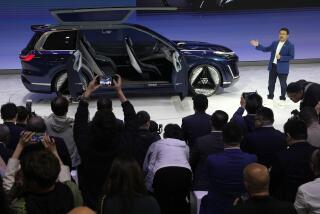U.S. Targets China in Trade Case
WASHINGTON â The United States and the European Union filed a trade case Thursday against China in a dispute involving auto parts as the Bush administration moved to deal with rising concern over a soaring deficit with China.
The complaint alleges that China is imposing high taxes on imported auto parts in violation of commitments it made when the country joined the World Trade Organization in 2001.
The action was the latest sign that the Bush administration is stepping up pressure on China in an effort to hold back a tide of protectionist sentiment in Congress.
Lawmakers, unhappy that Americaâs deficit with China soared to a record $202 billion last year, are pushing a number of bills that would impose economic sanctions on China in retaliation for what critics contend are unfair trade practices that have cost Americans thousands of jobs.
The administration is hoping to win major trade concessions from China in coming weeks as part of high-level economic talks between the countries April 11 and the Washington visit in mid-April of President Hu Jintao.
Without agreements from the Chinese in such areas as rampant piracy of U.S. computer programs, movies and music, the administration said it was prepared to file more WTO cases.
âWe will not hesitate to pursue our legal options when negotiations are not productive,â U.S. Trade Representative Rob Portman said in announcing the auto parts case.
Automakers in the U.S. and Europe have complained that China is forcing them to buy Chinese-made parts for cars they assemble in China because of tax policies that they contend violate WTO rules.
Because of surging domestic demand, Chinaâs car market has grown rapidly in recent years and is now second only to that of the U.S. But carmakers must buy at least 40% of the parts used to assemble the cars in China to escape being hit by sharply higher taxes.
Portman told reporters that the administration still held out hope that the auto parts fight could be settled before a dispute panel was convened at the WTO in Geneva. Under WTO rules, the two sides have 60 days to try to reach a negotiated settlement before a panel would be convened to hear the case.
If the U.S. and the EU win the case, they will have the right to impose penalty tariffs on Chinese goods equal to the amount of harm being done to their domestic automakers.
Members of Congress and the U.S. business community praised the new WTO case. Rep. Benjamin L. Cardin of Maryland, the top Democrat on the House Ways and Means trade subcommittee, said he hoped it would be âthe first of many in coming months.â
Myron Brilliant, vice president for Asia for the U.S. Chamber of Commerce, said: âThis is a very critical period in the U.S.-China commercial relationship. The business community expects a lot of deliverablesâ from China in terms of lower trade barriers.
Before the new case joined by the EU, the U.S. was the only country ever to have filed a WTO complaint against China. That earlier case, involving a Chinese tax rebate for semiconductor chips, was resolved during the consultation phase.
On a trip to China this week, Commerce Secretary Carlos M. Gutierrez warned the Chinese about a potential protectionist backlash in the U.S. President Bush said Thursday that he would stress during his meetings with Hu that âwe expect that country to treat us fairly.â
Before the Bush-Hu discussions, top administration and Chinese economic officials will meet April 11 to discuss such issues as Chinaâs efforts to crack down on piracy.






